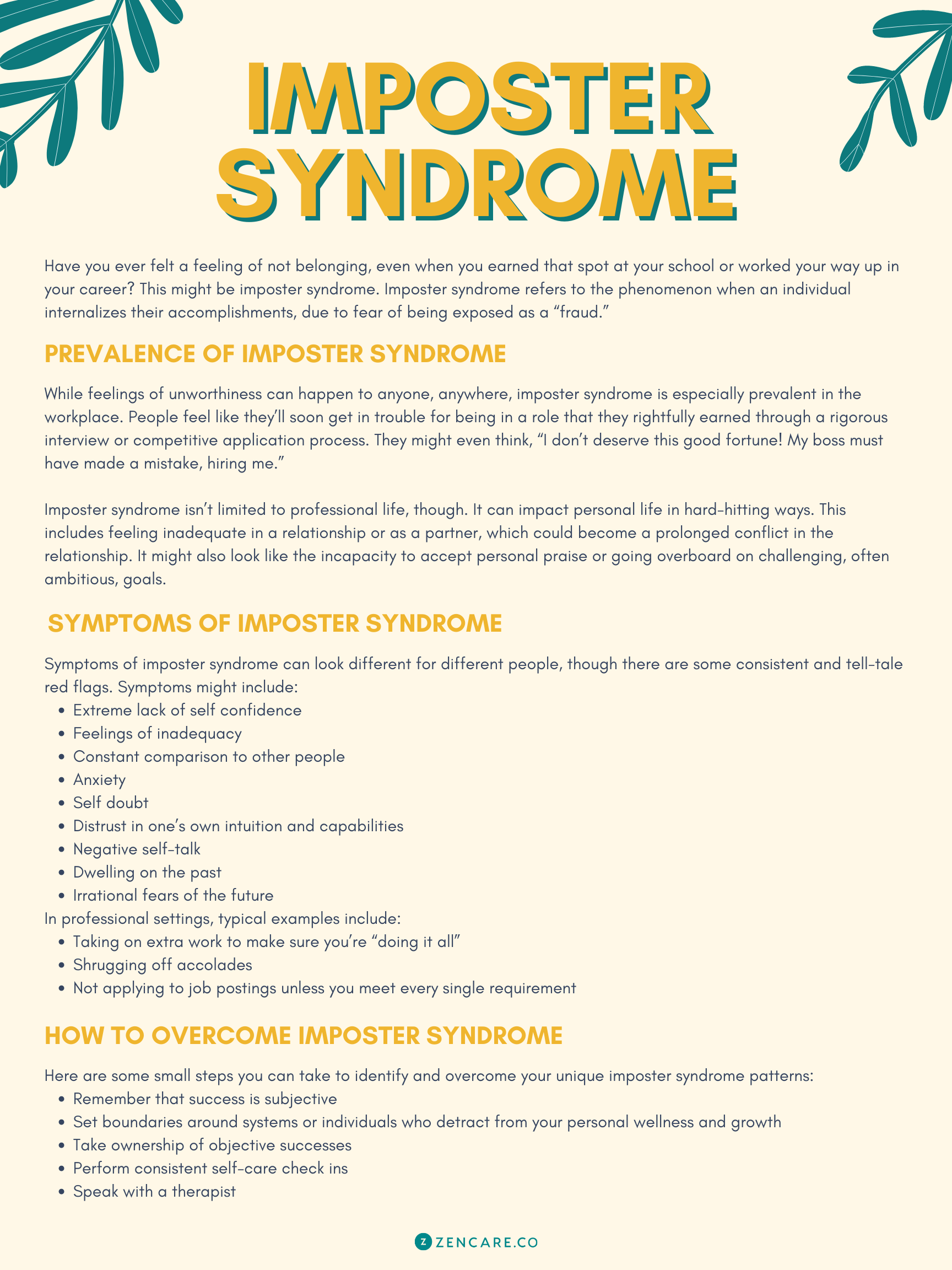Have you ever felt like you don’t belong, even when you’ve earned that spot at school or worked your way up the ladder at work but still have a low self-esteem? This might be imposter syndrome.
What is imposter syndrome?
Impostor syndrome refers to the phenomenon when individuals, often high achievers, cannot internalize their accomplishments, rather ascribing external factors for their hard work and successes in life. When someone experiences imposter syndrome, they feel like they do not deserve the praise, career growth or positive feedback, and are afraid they’ll be exposed as a “fraud.”
Those with imposter syndrome have high standards and are psychologically uncomfortable with acknowledging their role in their own success, and their negative emotions (often referred to as “cognitive distortions”) are based on anxiety and the imposter phenomenon, rather than objective facts. Although it was initially believed that imposter syndrome predominantly affected high-achieving women, subsequent gender-related data on the subject has revealed this isn’t the case — high-achieving individuals of all backgrounds and identities can sometimes feel out-of-place amongst their achievements even if they are doing more than a good enough job.

Prevalence of imposter syndrome
While feelings of unworthiness can happen to anyone, anywhere, most people experience imposter syndrome in the workplace. People feel like they’ll soon get in trouble for being in a role as a new hire, even when they rightfully earned that position through a rigorous interview or competitive application process and are doing their best work. They might even think, “I don’t deserve this good fortune! My boss must have made a mistake, hiring me.”
Imposter syndrome isn’t limited to professional life and can have detrimental effects on other parts of life. This includes feeling inadequate in a relationship with family members or as a partner, which could become a prolonged conflict in the relationship or relationship issues. Imposter syndrome might also look like the incapacity to accept personal praise or going overboard on challenging, often ambitious, goals, which can ultimately lead to burnout.
Symptoms of impostor syndrome
Symptoms of impostor syndrome can look different for different people, though there are some consistent tell-tale red flags. Symptoms might include:
- Extreme lack of self confidence
- Feelings of inadequacy
- Constant comparison to other people
- Anxiety
- Self doubt
- Distrust in one’s own intuition and capabilities
- Negative self-talk
- Dwelling on the past
- Irrational fears of the future
In professional settings, typical examples include:
- Taking on extra work to make sure you’re “doing it all”
- Shrugging off accolades
- Not applying to job postings unless you meet every single requirement
How to overcome imposter syndrome
Here are some small steps you can take to identify and overcome your unique imposter syndrome patterns:
- Remember that success is subjective and that it’s okay to feel good about your success
- Set boundaries around systems or individuals who detract from your personal wellness and growth
- Perform consistent self-care check ins
- Speak with a therapist about your experiences with imposter syndrome
Many therapists specialize in working with individuals who suffer from the impacts of imposter syndrome. A therapist can help you better understand your imposter syndrome-tendencies. Together, you’ll come up with ways to inhibit these tendencies so that you feel confident, empowered, and in-control of your emotions when it comes to acknowledging your accomplishments. Finding the right therapist begins with checking out multiple therapist profiles, which is easy to do on Zencare. Zencare includes personalized introductory videos for each therapist so you can get a feel for their approach and style. Once you find a therapist that matches your needs, schedule a consultation call with them through their Zencare profile — then you’re at the starting line for conquering your imposter syndrome!
